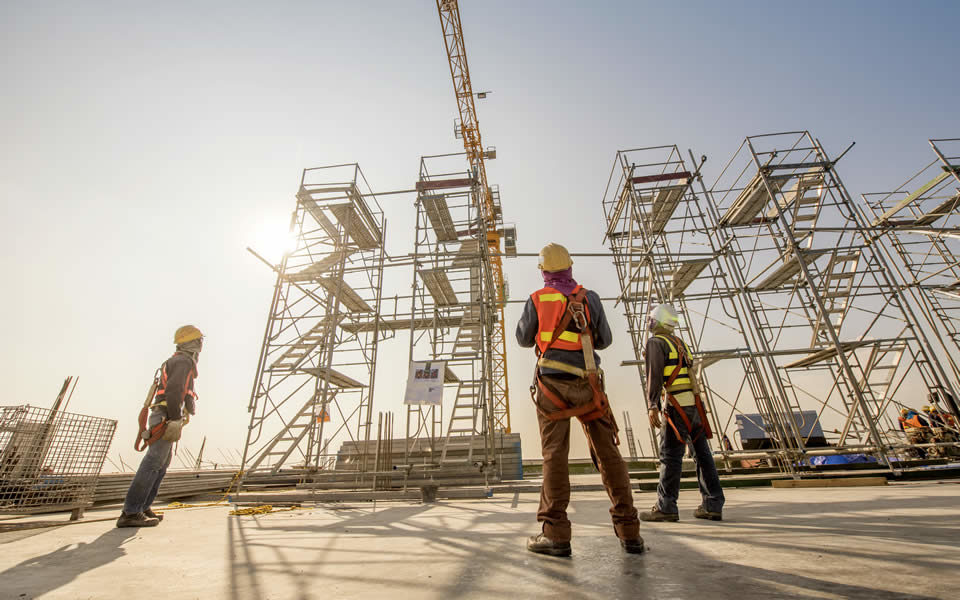5 Proactive Steps Construction Firms Can Take in Light of COVID-19
By Roger Gingerich, Partner, CPA, CVA, CCA
While every industry has been affected by the COVID-19 pandemic outbreak, construction work was deemed essential by most states, and most contractors escaped the early impact of the economic shutdown. The industry is concerned about long-term effects and how safety protocols will affect business. For example, many contractors are bracing for a slowdown in new projects as businesses (and lenders) evaluate the effect of the pandemic on revenue and the ability to invest in capital projects. New safety guidelines limit the number of workers per shift, calling for a change in scheduling contractors.
As COVID-19 cases spike in regions across the U.S. and with the next 12 months are murky at best, what can the industry expect moving forward? What can we expect the “new reality” to be for the construction industry?
The Cumulative Effect
According to the U.S. Bureau of Labor Statistics, the construction workforce dropped by 975,000 jobs in April, a 13% drop from March levels and the steepest decrease since the 1930s. Some work was postponed as customers – such as schools and offices – were forced to close. In many cases, it became impossible to obtain permits with city administration offices closed, all of which has had a sharp effect on lending. Most eligible construction firms are taking advantage of federal relief programs like the Paycheck Protection Program (PPP), which provides forgivable loans to small businesses to maintain operations and payrolls as long as they meet certain criteria. It is unclear whether there will be more funding available beyond 2020.
Global supply chain disruptions have forced construction firms to consider other options for sourcing materials, even if at higher prices. Some U.S. construction firms ordinarily rely on China – the origin of the COVID-19 outbreak – for more than 80% of their materials. And while China is coming back online, supply chains remain disrupted as shutdowns in the U.S. and other countries continue. As a result, the industry as a whole is being challenged by material price increases, longer delivery times, and job delays.
The impact to the construction industry will long outlive the pandemic. The industry will need to make far-reaching changes to tackle current challenges and make significant adjustments to be successful beyond this crisis. The following represent some immediate steps construction firms should consider.
1) Prioritize Workplace Safety
There is risk of COVID-19 at every workplace. Implementing strict safety precautions will help attract and retain crews, something especially critical given the long-lasting labor shortage.
Safety measures range from staggered shifts and face protection to handwashing stations and tool-sharing limitations. As an example, Ohio construction firms are expected to follow the workplace safety protocols required of all businesses in the state. In Washington State, job sites must meet the governor’s coronavirus construction safety plan. Employees must remain six feet apart, use personal protective equipment (PPE), and establish a housekeeping schedule that includes frequent sanitizing of commonly touched surfaces, or risk jobs being closed for noncompliance.
Many construction worksite safety precautions are here to stay. At a minimum, we can expect cleaner and safer job sites. OSHA will likely require written infectious disease preparedness and response plans.
2) Diversify Your Supply Chain
Before the pandemic, the construction industry was already bracing for a potential recession as well as shifting U.S. policy on tariffs and counter-tariffs. Supply chain unpredictability is nothing new, but when China was forced to shut down factories to contain the outbreak, the output of essential construction materials declined sharply from normal levels. Contractors are particularly concerned about the limited output of steel, electrical fixtures, concrete boards, and plumbing fixtures.
Watch for more manufacturing to take place in the U.S. and adjust your suppliers accordingly. As you seek to diversify your supply chain, it will become common for large contractors to bid out jobs with contract clauses requiring as many as five backup sources. Along with utilizing U.S. manufacturers, contractors should consider those countries that haven’t been as affected by supply chain interruptions as others.
3) Plan for Extended Job Completion Times
All of the above safety measures add up to more time to complete jobs. As you plan for projects, determine how you will factor these changes in and adjust deadlines accordingly. The schedule must make sense for you and your entire team.
4) Reevaluate Your Contracts and Policies
Be prepared for the unexpected. If you haven’t already done so, reexamine your insurance policies for business interruption provisions that can protect your firm against slowdowns and project cancellations. Some contractors may be contractually responsible for cost increases or delays on current projects due to “substantial completion” clauses. Your particular contract will specify whether the coronavirus pandemic qualifies as a force majeure event. Contractors should work with their attorneys to examine force majeure provisions in their current contracts and understand what needs to be included in future contracts to be covered for crises that cause projects to be delayed or cancelled.
5) Remain Focused on Skilled Labor
The lack of skilled labor that has plagued the construction industry continues. The PPP loan mentioned above has helped small businesses keep employees on their payrolls and retain them longer. Without additional stimulus funding, the ability to retain skilled labor may become more challenging. Unemployment rates have skyrocketed, so there may be opportunities to cross-train workers from other industries.
This is not a time for gloom and doom. The future of the construction industry remains bright, especially for projects in certain sectors, such as healthcare and warehousing. There is still a need for large infrastructure projects, such as airport improvements and new highways and bridges, throughout the U.S. With the general election ahead, it remains to be seen which infrastructure projects will be spearheaded with support from state and local building officials.
Construction firms that address COVID-19 challenges in the short term will be poised for success in the months and years ahead. The professionals in Marcum’s Construction Services Group are dedicated to helping contractors build a more profitable and valuable construction enterprise. Contact your Marcum professional for assistance.




















